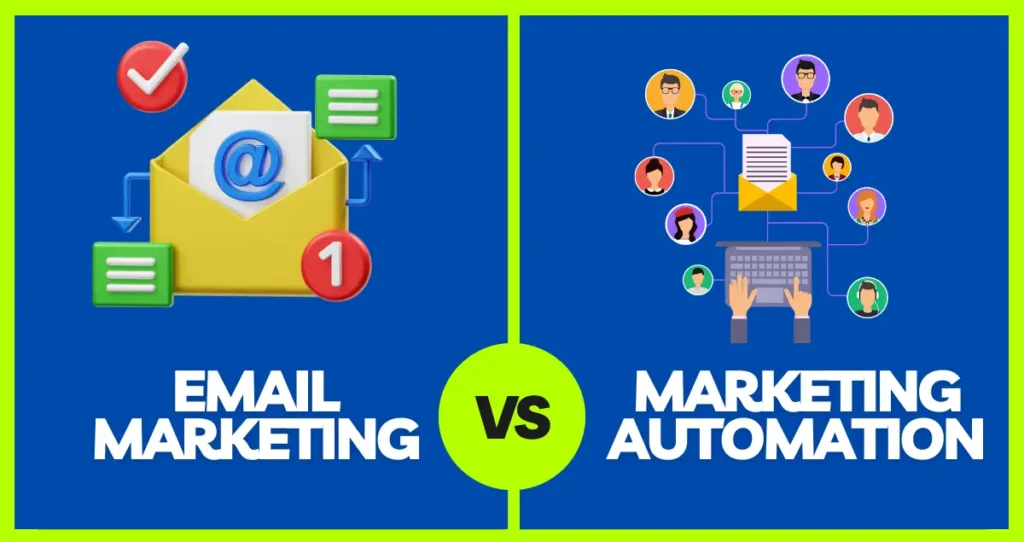Introduction:
Marketing automation gives businesses the power to improve efficiency and sales numbers. The technology helps companies of every size improve their operations and grow better connections with their customers. This blog will explain marketing automation fully by explaining its core features, how it works, the advantages it brings, and the top recommended tools.
Key Takeaways of Marketing Automation:

- Marketing automation will save you time by automating repetitive tasks.
- Automates lead nurturing, email, and social media campaigns.
- Marketing automation tools, such as email automation, autoresponders, appointment management, etc., personalize communication and drive customer engagement.
- The best-known tools are Marketo, Active Campaign, and MailChimp.
- Companies can save costs and improve ROI with a strategic approach to automation.
What is Marketing Automation?

It is the process of using software and tools that automate the same draining marketing tasks: emailing, posting on social media, and lead nurturing. The goal is to have the right messages to reach the right customers at the most fitting and easy times.
To give an example of this, you would instead set up an automation system where emails regarding follow-up are sent to leads after they download a resource. This is just one of many ways in which marketing automation simplifies otherwise complicated tasks so that businesses can scale better.
Contextual Use in the Digital Age
These days, marketing automation is critical. By automating marketing processes, a business can deliver personalized and timely content to its target audience. This saves time and guarantees that each engagement feels personal and, primarily, converts well.
What is an example of Marketing Automation in Action?

Lead Nurturing Workflow Example
Let’s take a look at a lead nurturing workflow for an illustration of what marketing automation is used for:
Suppose when your potential customer visits your website and downloads an eBook. Your automation system saves the day. Instead of waiting for the lead to return, it sends a series of follow-up emails. The emails will also contain related content, a free trial, or an inquiry for more details on the lead’s interest. The customer moves down the sales funnel over time and eventually converts. Such an automated workflow ensures that your leads are constantly nurtured even when your team is busy with other things.
How Marketing Automation Optimizes an Email Workflow?

Data Capture
The first process in automating emails is collecting the appropriate data. Marketing departments in companies employ items such as landing pages and lead generation offers (like eBooks and whitepapers). Once data is collected, it is possible to divide the audience according to various parameters, such as interests, behaviour, or previous purchases, thus making the marketing messages more relevant and convincing.
Customer Relationship Management (CRM) Platform
Marketing automation heavily relies on CRM as an integral component. In addition, it is a central hub where all customer data is stored. Based on this data, the business can create more personalized marketing for customers. For example, if the lead shows interest in your product but doesn’t buy, the automation from your system can trigger an email offering a discount on the product or more product info.
Downloading the Asset
Capturing leads through the use of downloadable content works. Visitors who download an eBook or a whitepaper enter their contact details into your email list. Automated systems can then nurture them by sending content related to what they saw or offered.
How can the system automatically send follow-up emails?
A system can also be automated when a lead does something after taking a lead, like downloading an asset, and sends a follow-up email. This ensures that the business keeps in contact with the lead and creates a relationship, leading to additional interaction. The better your emails are timed on a human visit at the particular time that a person is viewing them, and the more relevant you can make them, the more likely you are to convert that lead into a customer.
What Are the Benefits of Marketing Automation?

Cross-Departmental Collaboration
Marketing automation is more than marketing itself; it improves collaboration among various departments of an organization. An example of this is when marketing teams communicate their insights to sales teams that can. Ideally, they come up with a more effective strategy. Data sharing within the company becomes more systematic via automation tools. So, the overall customer experience and satisfaction will improve.
Save Time and Money
The first and most significant benefit of marketing automation is time and money savings. This paves the way for businesses to automate repetitive tasks and put their efforts into more potentially valuable campaigns and strategy development. Automation also aims to reduce staff headcount, which means that operational costs are lower.
Improved Budget Allocation
Marketing automation also helps businesses better allocate their budgets. In that sense, these tools enable companies to shift funds to high-performing channels and initiatives, allowing greater resource use and increased ROI.
Have a Better Target and Monitor the Audience
Marketing automation helps businesses track different indicators and analyze the desired audience’s behavior. Therefore, by adopting active user engagement analysis, you get ample opportunity to enhance your targeting and segmentation. This puts you in a position to create many campaign-specific promotions that are likely to gain more attention from the target market and, therefore, more sales.
Be Consistent with Branding
More effort should be put into maintaining coherency while creating a brand. One of the benefits of marketing automation is that it maintains cohesion throughout the customer’s communication through emails and social media. This is helpful in creating a good brand association with your intended niche market.
What Are the Best Marketing Automation Tools & Platforms?

Marketo
The market is a high-level marketing automation platform. It offers maximum robustness in features for lead management, customer lifecycle tracking, and advanced reporting. If you are a large firm with simple advertising demands, consider Marketo.
ActiveCampaign
Suppose you are a small to medium business looking for one of the few all-in-one email marketing and automation solutions. In that case, ActiveCampaign is the best solution for you. It combines email marketing with customer relationship management (CRM) to create a smooth flow from lead acquisition to conversion.
GetResponse
As with any other vendor, GetResponse has a good reputation for not only being friendly but also having powerful automation capabilities. It provides an email marketing solution, a landing page builder, and an automated workforce; all that it promises is ideal for enterprises that want an overall marketing solution.
Customer.io
It is clear here that Customer.io is focused solely on behavioral email marketing. This allows businesses to send personalized emails based on customer behavior. It enables timely and relevant communication with customers and thus enhances customer engagement.
MailChimp
One of the most popular and user-friendly email marketing platforms is MailChimp. Its automation features help businesses create email workflows that nurture leads and drive conversions. It’s a nice tool for small businesses to get automation.
Hootsuite
Its core is social media management, though it also has a marketing automation tool. From a single dashboard, it allows you to quickly check out posts and manage customer interactions on more than one social media platform.
ContentStudio
It is a multifaceted marketing automation tool that aids businesses in automating content creation, scheduling, and reporting. Businesses that, instead of having to publish their content on multiple channels manually as needed, would prefer to use this tool.
4 Steps Towards Effective Marketing Automation

Identify the Right Tasks
When starting marketing automation programs, businesses need to identify which marketing processes they should automate. Companies should prioritize automated tasks, which include email marketing operations, social media scheduling, and lead care activities. The freed-up time enables teams to focus on critical activities that require human involvement.
Select the Appropriate Automation Software
The right marketing automation platform must be chosen. The structure of the business determines its size, and budget and individual requirements will determine your choice. For example, a small business may prefer MailChimp or another highly simplistic tool, while a larger company can use something more complicated, like Marketo.
Train Your Team
Therefore, it is essential that adequate training is given regarding the tools used in the marketing automation processes. There will always be a group of people who will be using this software; ensure that they are trained on how to use it. This involves factors such as how to build the respective flow, how to categorize the viewers, and how to assess the campaign.
Monitor and Evaluate Automation Effectiveness
After finishing automation, you must set up methods to check its results and assess how well it operates. The correct metrics for campaign performance evaluation include these factors and future automation updates.
3 Marketing Automation Examples

Airbnb
A specific example of a business that applies marketing automation is Airbnb, which offers suggestions for travelling to a particular customer according to the customer’s search history in the application. This automated communication makes the customer more active and keeps Airbnb relevant in the user’s consideration set.
BuzzFeed
For instance, BuzzFeed uses emailing to convey relevant content to users. Based on the behavior exhibited by the user, BuzzFeed serves content that caters to the particular interests of each subscriber.
Netflix
It implements a marketing automation strategy to target platform users and offer them recommendations based on what they have watched. Sales promotion is also done through automated push notifications to engage users and encourage them to continue with their subscriptions.
Marketing Automation and AI

How AI Enhances Marketing Automation
The application of AI in marketing is necessary since it helps advance marketing automation. AI tools can use vast amounts of data to identify customer behavior patterns, suggest content, and contribute to correct decision-making.
Benefits of AI-Powered Marketing Automation
As with many other disciplines, marketing automation with the help of AI is getting a new layer brighter. AI can generate leads, and marketing scoring can also be done through AI; this way, audiences can also be parted in a better manner, and it gives out predictive analytics to help businesses make decisions about their future. Hence, heading becomes more effective and successful than when run independently.
Tips on Using Marketing Automation Effectively
Know Your Audience
It is essential in marketing automation as it is in any other interventionist’s process. People’s standards of behavior and preferences change with time, so to deliver more effective materials, you need to immerse yourself in their world more in-depth.
Set the Tone and Stick to It
All automated communication should follow consistency closely. Whether the brand is being targeted as fun, professional, or conveying knowledge, consistent messaging should be apparent.
Stay Human
However, in communication, particularly when automating tasks, it is necessary to retain humanity. It is essential to keep the tone casual while addressing the target group and avoiding clichés.
Mix It Up
Introduce diversity in communication to avoid monotony and redundancy. Communicate in various ways, such as videos, blog posts, and infographics, to keep the flow of communication diverse.
Make Use of A/B Testing
It is possible to utilize A/B testing for emails, landing pages, and other marketing materials. This way, the content is best optimized, and the results improve with each subsequent search.
Supercharge Your Digital Marketing Career with Rozi Academy
Marketing automation tools remain essential in today’s market. If you want to learn how to use them for career advancement, you should consider joining Rozi Academy. Incorporating automation strategies in digital marketing is one essential way of increasing your proficiency in digital marketing.
FAQS:
What is marketing automation?
This is the use of software to automate various marketing activities, such as email marketing, social media marketing, and other follow-up tasks.
How does marketing automation enhance customer relationships?
It also shows how businesses can conduct regular communications to enhance their relationships with customers and, hence, increase engagement.
Is marketing automation expensive?
The cost varies to some extent depending on the tool and the business’s needs; however, numerous free or low-cost automation options are available.
Conclusion
Marketing automation is an essential tool in any organization’s strategy that wants to work smart to achieve its goals and objectives. Automation contributes to more effective control of business processes, management of strategic directions, and product differentiation when interacting with the audience. True to the title, it provides a brief, concise coverage of each technique and its uses in the context of marketing strategy. Start today with the help of Rozi Academy’s marketing automation courses and take your business to the next level!







